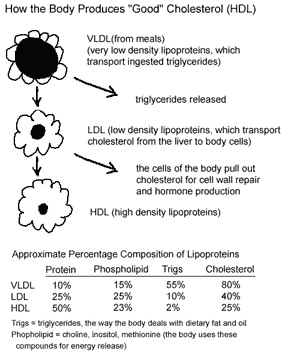Heart Health
Cholesterol

Have you followed any of the news about cholesterol?
It turns out that the results with dietary change varied from absolutely no effect to as high as a 15% decrease. However, NO effort was made to determine what caused these differences. One of the researchers interviewed on the radio actually said that they didn't look into it. He did however, admit that he suspected people just didn't stick to the diet.
Another interesting fact is that the ratio of HDL cholesterol ("good" cholesterol) to total cholesterol remained the same. That's bad news because the HDL total cholesterol ratio is what actually determines cardiovascular risk. High cholesterol values and high HDL values are actually better than both values being low. The result obtained in the study is exactly the opposite of the results at RFHC, probably because in the study no nutrients were supplied to support liver metabolism. Also, the dietary guidelines were too simplistic; apparently no effort was made to optimize the diet. Simple restrictive guidelines were applied - reduction of total caloric intake of cholesterol and saturated fats.
The third interesting thing is that Merck & Co. financed this study and Merck makes lovastatin, a cholesterol-reducing drug. To be more precise, Merck patented lovastatin in 1987, and it was the only cholesterol-blocking pharmaceutical on the market for some time. The brand name is Mevacor. There are possible consequences of taking lovastatin, or other cholesteral-reducing drugs, especially long-term. Specifically, these effects include: damage to the developing fetus in pregnant women, development of cataracts, increase in liver enzymes in the blood stream (indicative of death of liver cells), disintegration of muscle tissue, including the heart, (more common when used with immuno-suppressive drugs, but seen with lovastatin alone), liver cancer in mice, drug-related testicular atrophy, decreased sperm production and sterility in men. We haven't even gotten to the adverse reactions yet!
The adverse effects include constipation, diarrhea, dyspepsia, abdominal pain and cramps, nausea, headache, rash and itching, alteration of taste, tremor, facial paralysis, impairment of eye muscles, vertigo, memory loss, anxiety, insomnia and depression. In some cases even more severe reactions occur: some people develop auto-immune factors in the blood stream, chronic active hepatitis, fatty changes in the liver, cirrhosis, fulminating liver necrosis (the liver rots) and liver cancer. Some men have experienced enlarged breasts, loss of libido and erectile difficulties.
Actually, there are four pages on adverse effects of lovastatin in the Physician's Desk Reference which make pretty interesting reading.
To me, the most telling statement is that elevations in liver enzymes have not been reported since the first drug lovastatin went into clinical use. Could it be that follow-up testing is inadequate? Of greater concern is that these drugs have not been on the market many years. It will require 20-25 years for the full epidemiologic impact to be seen. Do you want to be a guinea pig? (see following article on CoQ10 Deficiency for more insight into this issue)
Don't be discouraged, however. There are safe and effective ways to lower your cardiovascular risk: optimum diet, customized nutritional supplementation and moderate exercise have demonstrated excellent results at the RFHC. If you are concerned about your cholesterol levels and cardiovascular risk call us today so that we can customize a program for you.
Does this apply to you? If so, see our information on Consultations.
[TOP]
© 2011 Richards Family Health Center. This site or any part may not be reproduced without the written consent of Richards Family Health Center. N Rowan Richards, DC, DABCI, FIACA at 242 South Glendora CA 91741. 626 963 1678. email:richardsfhc@richardsfamilyhealth.com. This site is Not intended to dispense health advice or serve as a substitute for actual patient contact with a qualified healthcare provider. Our sole purpose is one of education. It is our expectation that our site can educate our visitors about the efficacy of some healthcare treatments that exist as an alternative to conventional medical wisdom.
PRIVACY POLICY: Richards Family Health Center takes your privacy very seriously. Be assured that we do not sell or rent your contact information to anyone.


